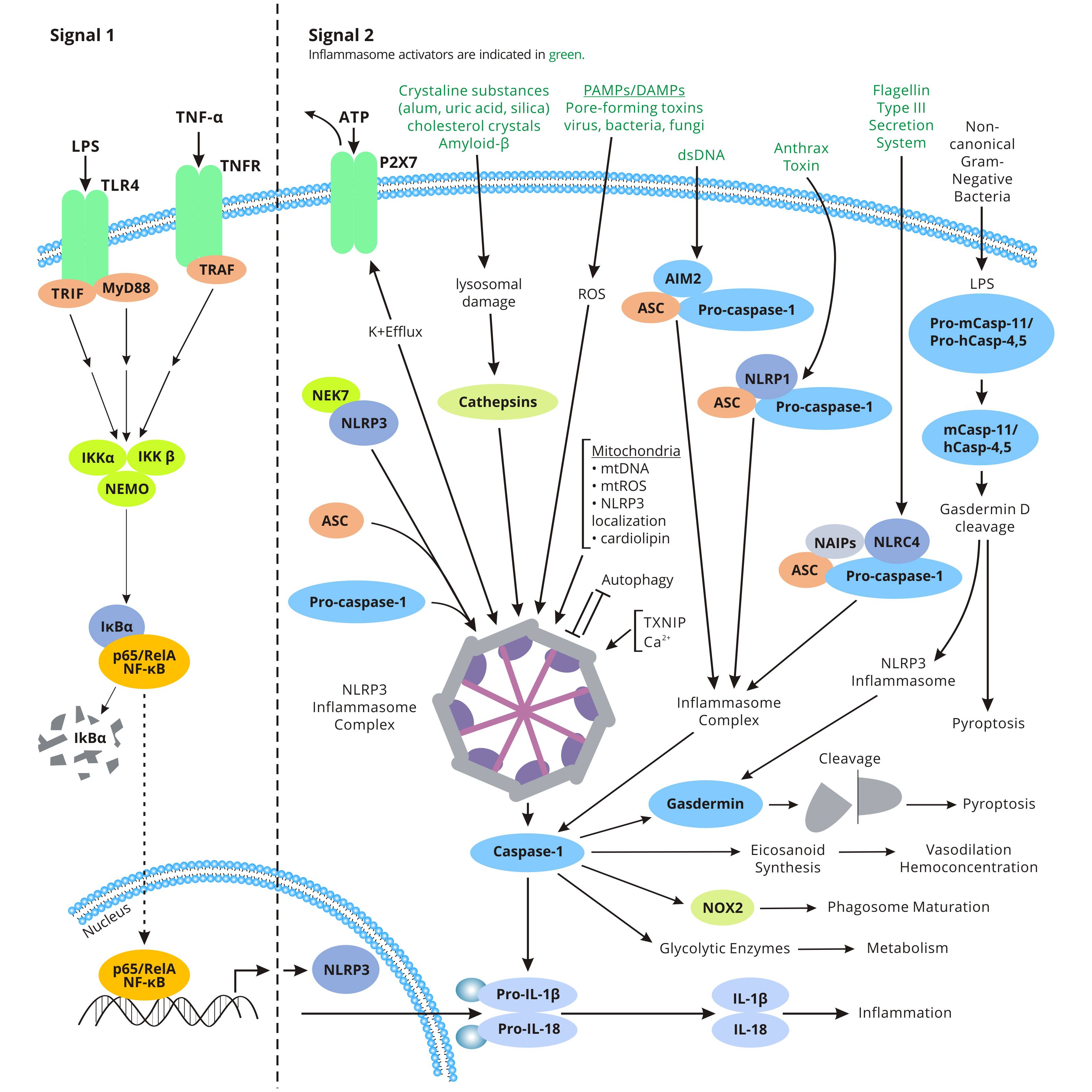
What Is An Inflammasome?
Inflammasomes are a battery of cytosolic multiprotein complexes, classically consisting of an upstream sensor protein of the NOD(nucleotide-binding oligomerization domain)-like receptor (NLR) family, the adaptor protein ASC, and the downstream effector caspase-1. It is an important component of the innate immune system.
The Function of Inflammasome Signaling
Inflammation is part of the body's natural healing process. In response to cellular stress, tissue damage, or different signals from infectious pathogens, the protein-based molecular machine inflammasome triggers inflammation. In the peripheral immune cell, activation of the inflammasome serves in a regulatory capacity in the induction of pyroptotic cell death to remove the damaging immune cell.
The Mechanism of Inflammasome Signaling Pathway
Activated by a variety of PAMPs (pathogen-associated molecular patterns) and DAMPs (damage-associated molecular patterns), the formation of inflammasomes is initiated by the NLR proteins such as NLRP1, NLRP2, NLRP3, NLRP6, NLRP7, NLRC4, and the AIM2 (absent in melanoma-2).
A number of inflammasomes have been recognized based on molecular structure such as NLRP1, NLRP2, NLRP3, NLRC4, and AIM2. The NLRP3 inflammasome, formed by the NLR, the adapter molecule ASC (poptosis-associated speck-like protein containing CARD), and the effector molecule pro-caspase-1, is the most studied and the best characterized. The N-terminal of NLRP3 has a PYD domain. After activation, it undergoes oligomerization through the NOD domain and recruits ASC through the PYD-PYD interaction with the ASC molecule. NLRP3 also a C-terminal CARD region, which can combine with the CARD region of caspase-1 (NLRC4 can recruit caspase-1 directly through its N-terminal CARD region). Through the interaction between these proteins, NLR-PYD-caspase-1, a large molecular weight protein complex termed inflammasome is formed.
Inflammasome assembly leads to the autocleavage of caspase-1. Active caspase-1 triggers the processing of pro-IL-1β and pro-IL-18 into their mature and bioactive forms: IL-1β and IL-18. The maturation and secretion of the proinflammatory cytokines IL-1β and IL-18 induce several biological effects related to inflammation, infection, and autoimmune processes. Activation of inflammasomes can also trigger pyroptosis. This effect usually ruptures the cell membrane perforation of infected cells within a short time and unleashes the cytoplasm containing inflammatory factors such as IL-1B and IL-18 into the interstitial space, activating the corresponding receptors of neighboring cells and causing more large-scale immune response.
Studies have been shown that inflammasome activity increases with age, indicating that inflammasomes are associated with neuroinflammation during neuronal aging. Neuronal aging will result in psychiatric disorders like depression. While neurons also secrete IL-1 family cytokines, activated microglia and astrocytes are the main sources of these cytokines in the brain.
On the other hand, a different set of NLRs, including NLRP1, NLRP3, and NLRC4, induce caspase-1 activation through the assembly of multiprotein complexes called inflammasomes. The activated of caspase-1 regulates maturation of the pro-inflammatory cytokines IL-1β, IL-18 and drives pyroptosis. IL-1β release mediates the activation of the IL-1 receptor signaling pathway and myeloid differentiation factor (MyD88)-dependent nuclear factor kappa B, resulting in the transcription of cytokines such as IL-8, S100, and macrophage inflammatory protein 2 (MIP2), generating cascade amplification effect.





